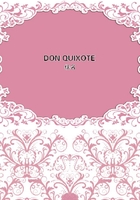
第315章
THEY reached their beasts in low spirits and bad humour enough, knight and squire, Sancho particularly, for with him what touched the stock of money touched his heart, and when any was taken from him he felt as if he was robbed of the apples of his eyes. In fine, without exchanging a word, they mounted and quitted the famous river, Don Quixote absorbed in thoughts of his love, Sancho in thinking of his advancement, which just then, it seemed to him, he was very far from securing; for, fool as he was, he saw clearly enough that his master's acts were all or most of them utterly senseless; and he began to cast about for an opportunity of retiring from his service and going home some day, without entering into any explanations or taking any farewell of him. Fortune, however, ordered matters after a fashion very much the opposite of what he contemplated.
It so happened that the next day towards sunset, on coming out of a wood, Don Quixote cast his eyes over a green meadow, and at the far end of it observed some people, and as he drew nearer saw that it was a hawking party. Coming closer, he distinguished among them a lady of graceful mien, on a pure white palfrey or hackney caparisoned with green trappings and a silver-mounted side-saddle. The lady was also in green, and so richly and splendidly dressed that splendour itself seemed personified in her. On her left hand she bore a hawk, a proof to Don Quixote's mind that she must be some great lady and the mistress of the whole hunting party, which was the fact; so he said to Sancho, "Run Sancho, my son, and say to that lady on the palfrey with the hawk that I, the Knight of the Lions, kiss the hands of her exalted beauty, and if her excellence will grant me leave I will go and kiss them in person and place myself at her service for aught that may be in my power and her highness may command; and mind, Sancho, how thou speakest, and take care not to thrust in any of thy proverbs into thy message."
"You've got a likely one here to thrust any in!" said Sancho; "leave me alone for that! Why, this is not the first time in my life I have carried messages to high and exalted ladies."
"Except that thou didst carry to the lady Dulcinea," said Don Quixote, "I know not that thou hast carried any other, at least in my service."
"That is true," replied Sancho; "but pledges don't distress a good payer, and in a house where there's plenty supper is soon cooked; I mean there's no need of telling or warning me about anything; for I'm ready for everything and know a little of everything."
"That I believe, Sancho," said Don Quixote; "go and good luck to thee, and God speed thee."
Sancho went off at top speed, forcing Dapple out of his regular pace, and came to where the fair huntress was standing, and dismounting knelt before her and said, "Fair lady, that knight that you see there, the Knight of the Lions by name, is my master, and I am a squire of his, and at home they call me Sancho Panza. This same Knight of the Lions, who was called not long since the Knight of the Rueful Countenance, sends by me to say may it please your highness to give him leave that, with your permission, approbation, and consent, he may come and carry out his wishes, which are, as he says and I believe, to serve your exalted loftiness and beauty; and if you give it, your ladyship will do a thing which will redound to your honour, and he will receive a most distinguished favour and happiness."
"You have indeed, squire," said the lady, "delivered your message with all the formalities such messages require; rise up, for it is not right that the squire of a knight so great as he of the Rueful Countenance, of whom we have heard a great deal here, should remain on his knees; rise, my friend, and bid your master welcome to the services of myself and the duke my husband, in a country house we have here."
Sancho got up, charmed as much by the beauty of the good lady as by her high-bred air and her courtesy, but, above all, by what she had said about having heard of his master, the Knight of the Rueful Countenance; for if she did not call him Knight of the Lions it was no doubt because he had so lately taken the name. "Tell me, brother squire," asked the duchess (whose title, however, is not known), "this master of yours, is he not one of whom there is a history extant in print, called 'The Ingenious Gentleman, Don Quixote of La Mancha,' who has for the lady of his heart a certain Dulcinea del Toboso?"
"He is the same, senora," replied Sancho; "and that squire of his who figures, or ought to figure, in the said history under the name of Sancho Panza, is myself, unless they have changed me in the cradle, I mean in the press."
"I am rejoiced at all this," said the duchess; "go, brother Panza, and tell your master that he is welcome to my estate, and that nothing could happen me that could give me greater pleasure."